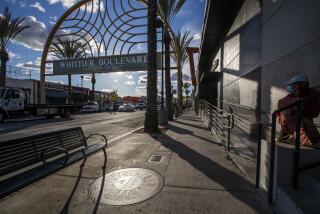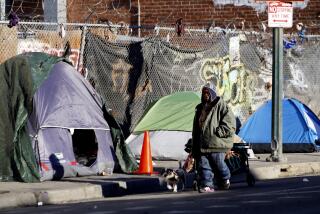L.A. County supervisors balk at taking over troubled Vernon
Los Angeles County supervisors expressed grave concerns Tuesday about taking over the troubled city of Vernon, throwing into doubt a state effort to forcibly disincorporate a city for the first time in modern California history.
Board members, who were early supporters of disincorporation, said recent revelations in The Times about Vernon’s large debts and poor investments have made them wary of taking over some parts of the city’s government. Although Vernon has long touted its financial prowess, a Times investigation found that over the last six years, the city has amassed nearly $500 million in debts and lost more than $100 million in net assets in its power business.
After the report appeared in the paper, supervisors last week asked county officials to review Vernon’s financial records. A subsequent staff report concluded that there were many financial unknowns and potential risks in absorbing the city’s debt and long-term obligations.
“Having another fiscal Pandora’s box is not in the best interest of the county’s taxpayers,” Supervisor Mike Antonovich said Tuesday.
Supervisor Zev Yaroslavsky added that Vernon’s debts could drag down the county’s finances.
“The big risk of this whole deal is we’re going to end up buying a pig in a poke, having a responsibility we can’t afford to assume,” he said.
Assembly Speaker John Pérez, the architect of the disincorporation plan, has been working behind the scenes over the last week to assuage the county’s concerns and make modifications to the legislative package.
Pérez’s spokesman said he remains committed to dissolving Vernon’s government. The legislation has already passed the Assembly and is expected to go before the Senate as early as next week.
The county’s position on the package of bills is critical because under the plan, Vernon would become an unincorporated area and the county would be responsible for law enforcement, economic development, public works and land use. A separate special district overseen by the Board of Supervisors would take over Vernon’s Fire Department and electric utility.
The county supported Pérez’s primary disincorporation bill, AB 46, but it has not taken an official position on a companion bill, AB 781. Yaroslavsky said he feared that if the special district was unable to handle Vernon’s financial problems, the county would be liable.
Antonovich added that when the board originally supported AB 46, its members were “unaware of the multibillion-dollar liabilities that we would face if this city became disincorporated.”
The staff report said there were long-term risks associated with the bonds issued by Vernon’s electric utility. It also noted that Vernon’s general fund has operated at deficits ranging from $20 million to $33 million over the last five years and that the city’s financial condition would not be sustainable without new sources of revenue.
John Vigna, Pérez’s spokesman, said the speaker’s office would continue to work with county officials on the details of the plan. “Our intention is to get this done” before the Legislature ends its session Sept. 9, he said.
Pérez has argued that Vernon has been operated as a “private fiefdom” and that disincorporation is the only way to root out corruption.
The industrial city, just south of downtown Los Angeles, is home to 1,800 businesses but only about 100 residents. Nearly all the residents live in homes or apartments owned by the city and many have close ties to city leaders.
The city rarely holds competitive elections, and some of its council members have held office since the 1970s. Over the last six years, three top officials have been convicted on public corruption charges.
Late last summer, The Times reported that five top Vernon officials had earned more than $500,000 in annual compensation, including Eric T. Fresch, a former city administrator who made as much as $1.65 million in 2008.
Pérez introduced the disincorporation bill in December. The legislation received overwhelming support in the state Assembly, passing on a 62-7 vote. But it was fiercely opposed by Vernon city officials, local businesses and labor leaders, and once it reached the state Senate it faced greater resistance.
State Sen. Kevin De Leon (D-Los Angeles), whose district includes Vernon, withdrew his support of AB 46 this week and introduced an alternative reform plan. His recommendations include the appointment of an independent monitor who would report to the Legislature; development of new housing that would double the city’s population; and the establishment of a “substantial and long-term Environmental and Community Benefit Fund.”
De Leon said he would not support AB 46 at this point because he wanted to give city officials more time to approve “sincere black-and-white reforms.”
“Now, it’s up to the city of Vernon,” De Leon said Tuesday. “They can accept substantial reforms or they only have themselves to blame. It’s just that simple.”
Fred MacFarlane, a Vernon spokesman, said the City Council would address De Leon’s recommendations at a special meeting Thursday.
Los Angeles Times staff writer Marc Lifsher from Sacramento contributed to this report.
More to Read
Start your day right
Sign up for Essential California for news, features and recommendations from the L.A. Times and beyond in your inbox six days a week.
You may occasionally receive promotional content from the Los Angeles Times.







